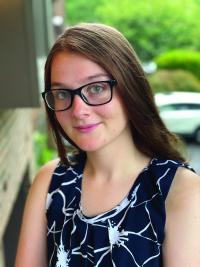Imposter Syndrome, the Joys of Physics, and What Makes a Good Researcher
Spring
2023
Feature
Imposter Syndrome, the Joys of Physics, and What Makes a Good Researcher
A conversation with Eric Cornell, plenary speaker at the 2022 Physics Congress
By:Sarah Lampreich, SPS Reporter, Temple University
author headshot - Sarah Lampreich.jpg

Sarah Lampreich. Photo courtesy of Lampreich.
At the 2022 Physics Congress, Dr. Cornell was a superstar. At times there were lines of students waiting to meet him, snap a picture, and get an autograph. To many physics students, a Nobel laureate is larger than life—the type of person you aspire to be but never dare imagine is possible. But as we settled into a small conference room for this interview, Dr. Cornell was soft-spoken, humble, and relatable. When I asked if there was anything outside of his physics identity he would like to tell fellow SPS members about himself, he nodded. There was a brief silence.
"There is a lot that people might not know about me," he said from across the table. "I am a proud father of two daughters,” he noted first. He also loves reading novels and hiking in the mountains of Colorado. And he’s an amputee, having lost his left arm and shoulder. "I think that had the amputation come earlier in life, it could have been a pretty significant disability for a career in experimental physics. But as it turned out, I was mostly in the phase of my career where I tell other people to do things, so it turned out not to matter very much," he said.
I asked Dr. Cornell how winning the Nobel Prize changed his career. He said that the biggest impact came not from the 2001 prize but from publishing the research that led to the prize. "Before then, I was an obscure young assistant professor, talking at the backwater sessions of the American Physical Society meetings. After the publication, I was the keynote. In terms of change in my life, that was a bigger moment," he said.
He laughed while adding, "Some things didn't change that much. You might think that my grant proposals are always approved now. Well, no. I was on a cold streak where I had like three grant proposals in a row turned down."
I asked Dr. Cornell if he struggled with imposter syndrome during this accelerated career advancement. “In some sense, it just moved the scale," he said. "You may no longer feel like an imposter as a physics professor, but you might feel like an imposter as a famous physics professor." He then shared this story. "I remember when I was a graduate student, talking—almost fighting—with a tenured physics professor from Harvard University. I was thinking, ‘He is all I could possibly hope to be,’ and it was weird to realize that he was kind of insecure and threatened by something I had said. At the time, I wondered how that could be. Now I completely understand it."
Our conversation then pivoted to the joys of physics. Dr. Cornell smiled as he said, "A lot of the joy of doing physics is other physicists. I find working together with other people toward a common goal to be very enjoyable. The social aspect of the business is a big part of it; that's a part that I love."
Regarding physics as an intellectual pursuit, Dr. Cornell cited elegance as a particular attribute that brings him joy. "There is this economic approach to ideas. One of the things I liked about being a physics major is that it was very difficult, but there weren't a lot of things to remember. I liked that out of all the majors, this had probably the fewest facts that you needed to know," he said. “The elegance of being able to understand all these different things with just a small number of basic ideas—that's part of the joy of physics," he said.
In closing, I asked Dr. Cornell what trait he believes is most valuable in a research career. "It really helps to have a sense of perspective," he said.
He explained that perspective is on a sliding scale, like a fancy camera where you twist the lens one way to zoom in and the other way to zoom out. In research, you sometimes need to zoom all the way in on a particular obstacle and say, "I'm going to focus on this one thing, and if I have to bash it down with my forehead, I will." But he noted that at other times you need to zoom out and say, "I will just take a little break here, see what I really care about—what really matters—and where all this is going." That change in perspective might lead to a solution or help you realize that the brick wall you've been fighting doesn't even matter in the long run, he said.
Some responses have been edited for clarity.
Who Will You Recognize for Outstanding Service to SPS?
SPS Outstanding Service Awards acknowledge outstanding chapter leaders—students, faculty, and staff—who further the mission of SPS and aim to support the health of the organization and the broader community through service. Chapter members can nominate candidates at any time. For details see spsnational.org/awards/service.


